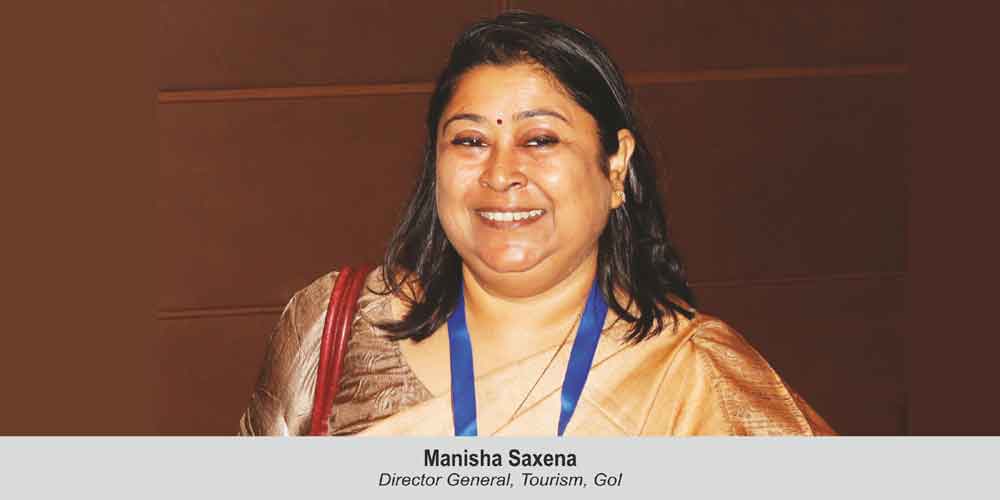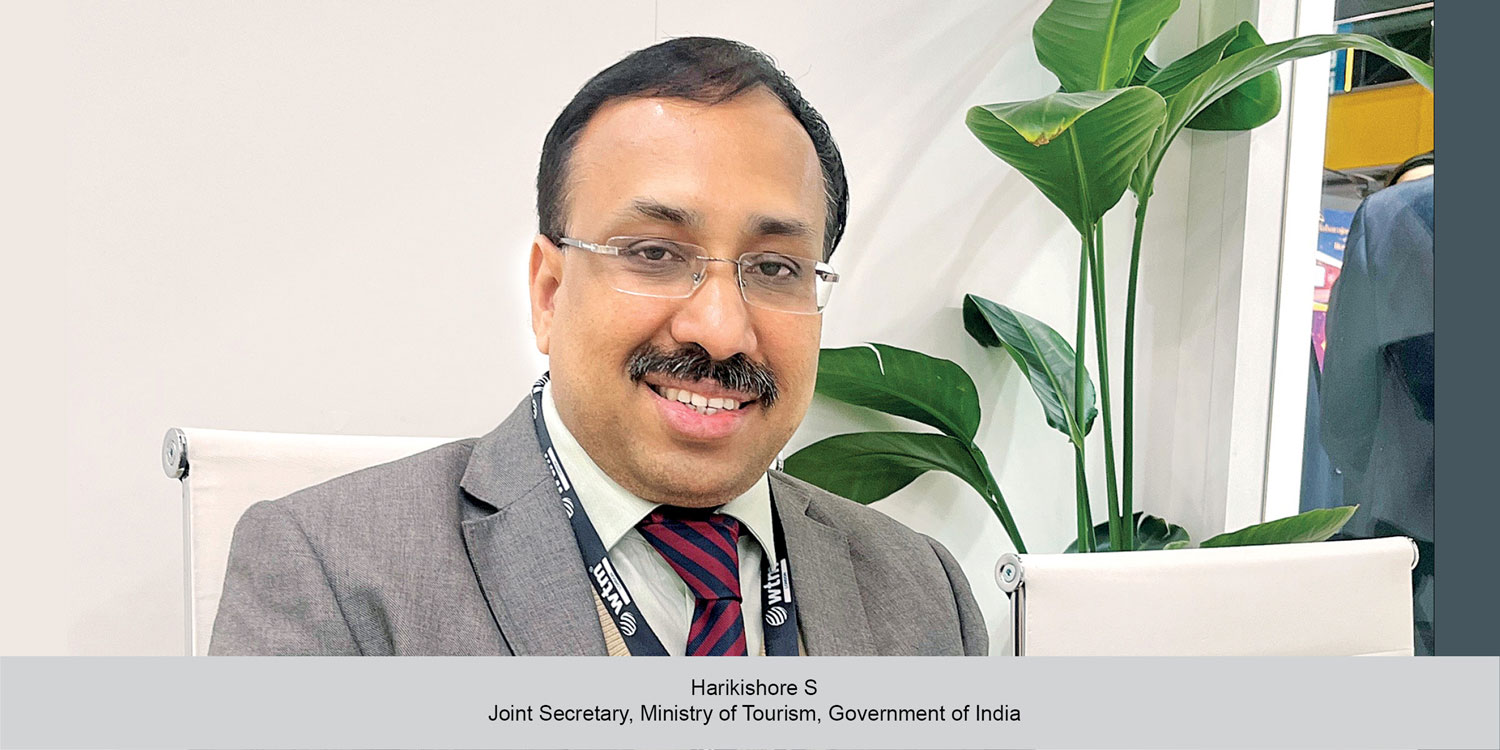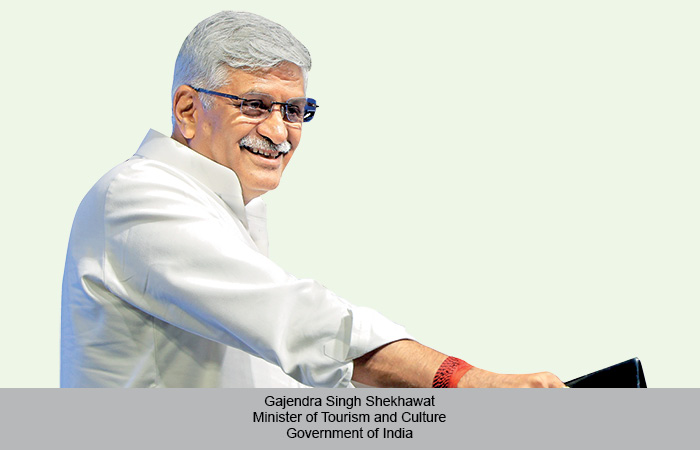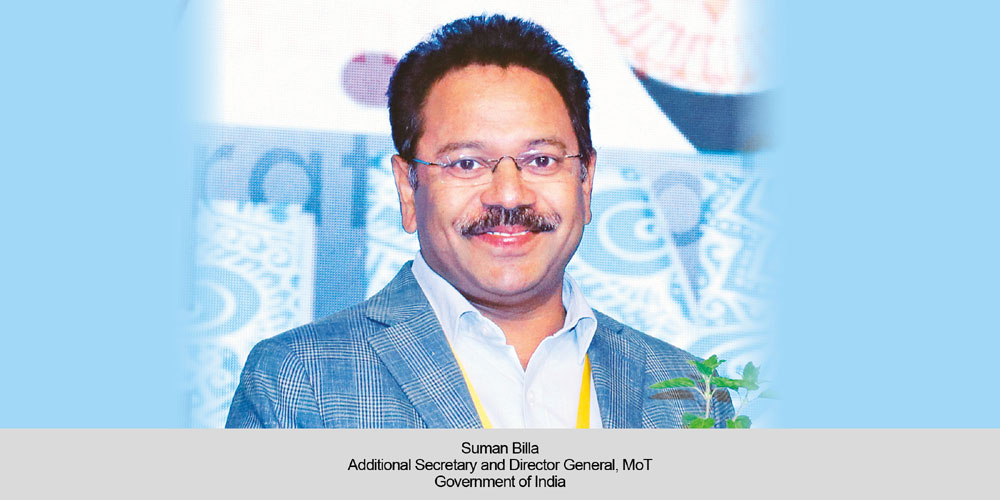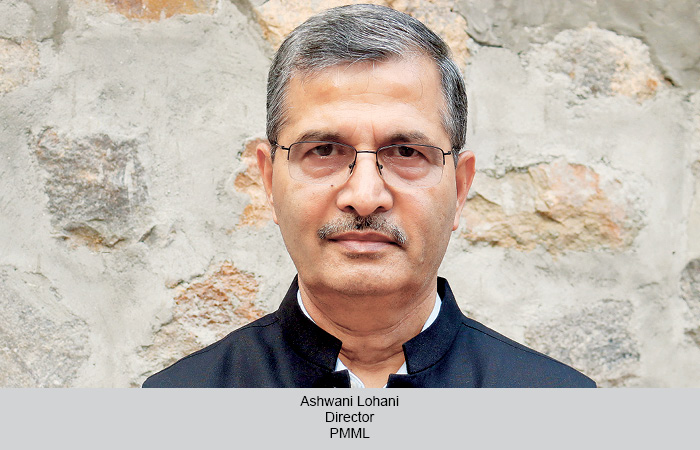Ministry keen on building public private partnerships
Manisha Saxena, Director General, Tourism, Government of India, talks about how public private partnerships (PPP) will be instrumental in developing destinations in the country.
TT Bureau
The Ministry of Tourism, Government of India (GoI), recently organised a roundtable conference in New Delhi, which aimed to leverage the “immense” potential of India’s Tourism Ecosystem. Delegates from various organisations, including NITI Aayog, UNESCO, UNEP, WTTCII, IUCN, IHMCL, IRCTC, PHD Chamber of Commerce and Industry, FHRAI, and international entities like the Intrepid Group. Ministries/ Departments from the Central and State Governments, along with representatives from the travel and tourism industry and educational institutes, attended the event.
Underlining the impact of perception on tourism, V Vidyavathi, Secretary, Tourism, stressed on managing the perception of tourists. “It’s crucial to acknowledge that tourism primarily thrives on perception. Managing perception becomes pivotal. Aligning tourists’ expectations with the actual experience is vital, which emphasizes the need to focus on building accurate perceptions while ensuring tourist and environment-friendly initiatives,” she said.
Manisha Saxena, Director General, Tourism, GoI, in her session, titled ‘Travel and Tourism Policy and Enabling Conditions’ mentioned that the MOT is in a mission mode for private partnerships. “We are keen towards building more partnerships for tourism promotion in India and the upcoming Incredible India portal, which has seen a beta launch finally. It is an example of how we are tying up with all the private partners to welcome people into India,” she said.
She asked industry experts for their perspectives on challenges and opportunities arising with private and government partnerships sector in tourism sector.
Sumitro Kar, Manager Programme & Communications, WTTC India Initiative, answered, saying, “We should focus on a state which has traditionally seen lesser footfalls and do a private public partnership to develop a couple of destinations, create a marketing plan for them, make a way to promote it to international and domestic tourists and create unique pilot projects. WTTCII would be very happy to partner with MOT for this initiative.”
Speaking on promoting lesser-known destinations, Sameer Bajaj, Head of Corporate Communications, MakeMyTrip, said, “We need to embrace digital. India has 600 million mobile phone users and 80 per cent of all travel searches happen on mobile phones in the country. Hence, when we talk about a country like India, we need to talk scale. Firstly, there are solutions to everything. There is programmatic marketing, where we can target a specific traveller who is travelling to a specific destination and nudge him to move away from that destination technologically. Discoverability leads to easier decision making for travellers.”
Saxena asked about the challenges in collection of data and the ways to overcome the same. Karan Mahesh, Account Manager, Central & South Asia, STR, answered the same, saying, “80 per cent of my money comes from 20 per cent of my destinations. I am not at all discounting the fact that the other 80 per cent of destinations need to be marketed and improved and focused upon. However, if I am able to make a small change in these 20 per cent of destinations, the return on that investment is going to be 80 per cent more as compared to if I would make big changes in other smaller destinations.”
Speaking on steps to ensure that these experiences are consistently delivered at every well-known or lesser-known location being projecting on digital portals, Kamal Kant Pant, Principal, IHM Pusa, said, “Many people in the days to come would like to try their hands at more things and therefore to interest people, the learning cycles in such situations have to be shortened.”
Saxena said that with the trend of employing more local communities, how does the background check happen for companies like MMT. Responding to the same, Bajaj shared, “The way marketplace would work is, if a specific entity doesn’t deliver the desired experience, then the ratings go down.”
Announces iMICE event
MOT’s Incredible M!CE event, announced at the roundtable conference in New Delhi, aims to elevate India as a M!CE destination.
Janice Alyosius
In a move to strengthen India’s presence in the global M!CE industry, the Ministry of Tourism, organised a roundtable at Bharat Mandapam in New Delhi. The event witnessed the convergence of CEOs and senior leaders of industry, who deliberated on the future of India as a world-class M!CE destination. There was palpable excitement for the upcoming Incredible M!CE (iM!CE) event, which is anticipated to further elevate India’s profile as a M!CE destination. The roundtable was a direct response to the overwhelming global interest sparked during India’s G20 Presidency. The event attempted to capitalize on the successes of the G20 summit, which highlighted India’s advanced M!CE infrastructure and rich cultural heritage.
V Vidyavathi, Secretary, Tourism, GoI, in her opening remarks, emphasized on three key agendas: Enabling Environment, Policy Regime, and Sustainability. She called upon global agencies and industry leaders to consider their contributions to the tourism ecosystem and how the ministry can enhance the sector, building on the momentum created by India’s G20 Presidency.
Rakesh Kumar Verma, Additional Secretary, Tourism, GoI, followed with a comprehensive presentation on the National Strategy for M!CE Industry, detailing the vision, mission, goal, and key strategic pillars critical for nurturing and promoting the M!CE industry in India.
The roundtable witnessed a collective and insightful contribution from CXOs and senior leaders across the M!CE industry, including hotel chains, Professional Conference Organizers (PCOs), and key players in inbound M!CE business such as Accor Group, Marriott Hotel Group, The Leela Palaces, Hotels and Resorts, Jio World Centre, Yasho Bhoomi (Kinexin), Alpcord Network Travel & Conferences Management Company, Radisson Hotel Group South Asia, ICE Incentive Conference & Event Management, and India Exposition Mart.
The diverse feedback emphasized on India’s rich cultural and natural diversity as a significant attraction for M!CE tourism, while also underlining the untapped potential within the domestic market. Industry representatives recognized India’s stature as a knowledge hub, foreseeing its ability to attract a myriad of M!CE events across various sectors.
Jyotsna Suri, Chairperson & Managing Director, The Lalit Suri Hospitality Group, emphasized on the importance of incentivizing corporations to choose India as a preferred M!CE destination. “Most of our weddings and M!CE movements are taking place outside India. Particularly for M!CE, we now have excellent infrastructure, and I strongly believe that offering a little incentivization to corporates would be immensely beneficial. In the case of weddings in India, it’s not just about the ceremony; we require more hotels and improved connectivity to various areas. By promoting the ‘I Do’ campaign extensively, we can start domestically and gradually expand internationally,” she said.
Naveen Kundu, Managing Director, Ebixcash, highlighted the necessity for streamlined access to regulatory companies in India. “We handle approximately 100,000 people in M!CE every year. Last year, due to visa unavailability, we conducted 50-55 per cent of these activities in India, and the rest were carried out overseas. This year, 70 per cent of our activities were conducted overseas, with only 30 per cent remaining in India. One critical action that the ministry ought to take is to ensure access to all regulatory companies in India. The ministry should send letters or issue advisories to these companies through the regulator, addressing the observed trend of sending people abroad. This trend leads to significant losses for the exchequer, particularly concerning the outflow of foreign exchange. Currently, India is experiencing an outflow of $5.39 billion in foreign exchange, and tourism alone contributes to 20-30 per cent of this outflow annually.”
Puneet Narula, Hospitality Business Head – Convention & Exhibition Centre, Reliance Industries, highlighted the space constraints in India for future conventions. “85-95 per cent of our business in the last year and a half has been exclusively domestic. Someone mentioned that our books might not have enough space, and that holds true. Consequently, a ‘yes’ for a convention in 2024 and 2025 here in India might not materialize. Even if it were to happen today, it’s likely that I would have already allocated that space to an exhibition or a domestic conference. However, we need to reconsider our share of the market significantly; this is crucial,” Narula said.
Narula also underscored the need for India to leverage its inherent strengths. “We possess a significant opportunity, and India has everyone’s attention. However, the convention bureau, like the ICPB or its reinvention, must focus on business development rather than just marketing. They need to take the lead in this aspect,” he said.
 TravTalk India Online Magazine
TravTalk India Online Magazine

